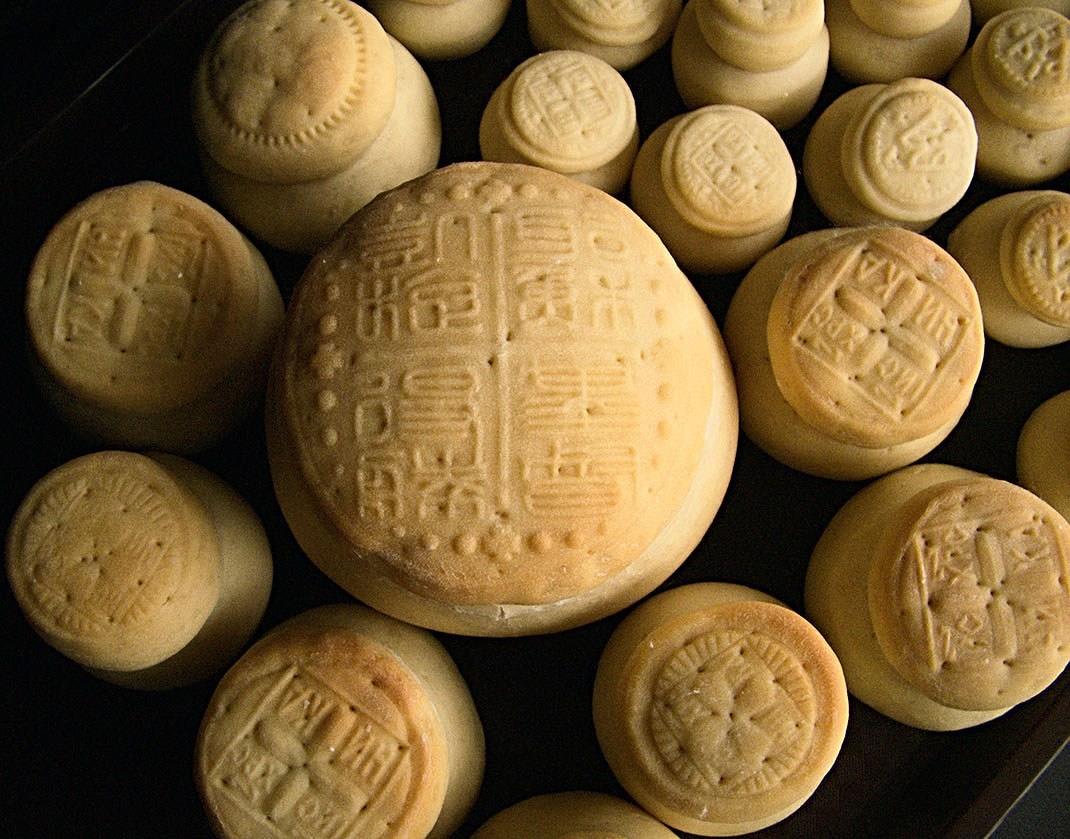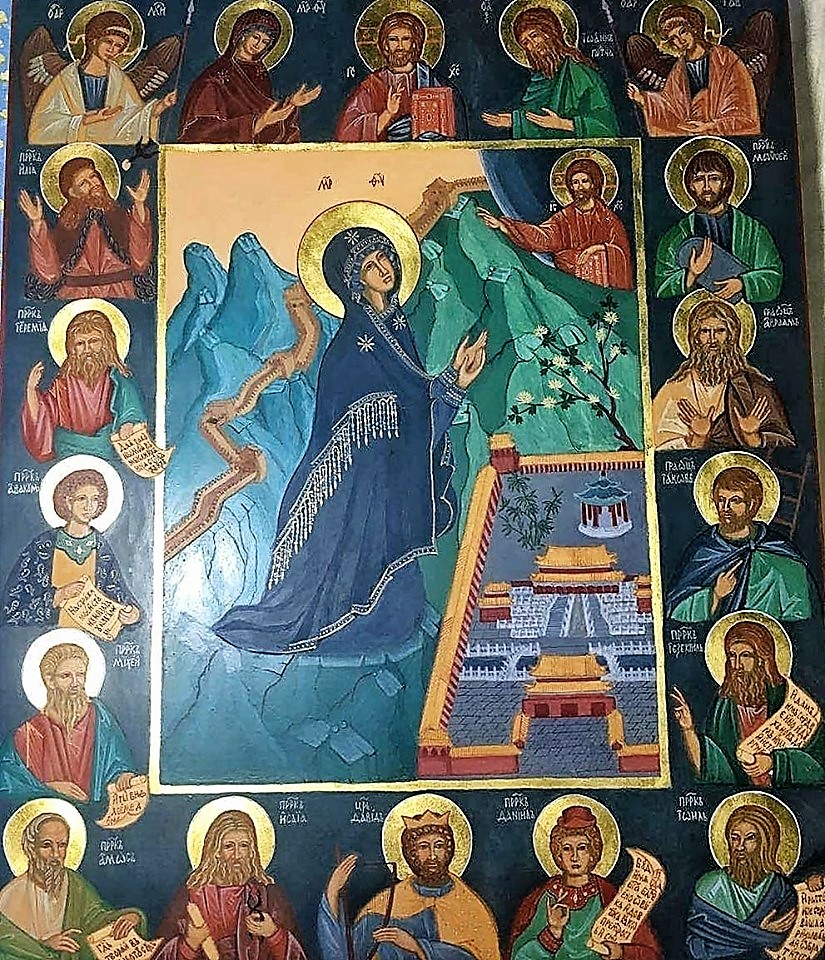In the Beginning was the Tao
I was glancing through books in our church library and found a book written by Hieromonk Damascene about the commonalities of the ancient Chinese thinker Lao Tzu and Orthodox thought. As I read this artistic and poetic book, Christ, The Eternal Tao, I pondered the complex and soulful connections between Orthodoxy, ancient Chinese philosophers and the concept of the Tao. OK, really I felt more and more confused so I tried to get just a simple idea of how ancient Chinese thinkers may have sown seeds that can help Christianity flourish in modern China.
In China, modern Christians refer to the “word” of God as the Tao—the Way. C.S. Lewis has used the word Tao to express a heartfelt natural law or traditional morality which guides us. The Way is also a name for Jesus, the incarnate Tao. Tao can also be translated “The Word”.
If you were able to read Chinese, and you opened a Chinese Bible, you might see this at the beginning of John:
In the beginning was the Tao
So, the Tao is something that transcends culture. Because we were created in God’s image, we carry an inner Tao which can help us draw near to God whether we’ve heard of Him or not. Many of the ancients, both Greek and Chinese, developed beliefs which were compatible with the belief in God. Our yearning for eternity, those prickly ideas of justice and of injustice, and the nagging feeling that things are awry but that they should somehow be better someday are examples of how we innately know that there is a Way, a Tao, a universal truth.
Icon of the Mother of God- The Word Made Flesh. Albazin, China 1600’s
This icon of the Theotokos was brought to China in the 1600’s by Russian Orthodox missionaries. It has comforted and helped the people in a region called Albazin for centuries. This community was one of the ones that St. John the Wonderworker served. The gentle icon of the Word Made Flesh makes me think back to the Tao, the light within that Jesus illumines. Mary is shown gently almost caressing this light of Christ in front of her heart. We should be emulating her gentle humble faith, but are we?
In Western countries, we are freely casting off God and wresting control of our inner Tao by rejecting traditional morality and promoting self-determination—literally doing things our own way. Others of us are striving to follow Christ while having a sense in the back of our minds that maybe the culture has gone too far and we don’t even know how off base we are with it. It’s hard to take your own temperature when you’re a frog in a figurative pot of boiling water. How can I hear the gentle words of Christ, the Tao, when my culture and life events seem to be screaming at me?
photo courtesy of the China Museum
Meanwhile in China, the government is using modern technology to try to control people’s lives and faith systems—to force a Communist way. Just as some in the West are forcing our friends and neighbors to verbally conform to whatever idea pops into their heads, in China the Muslims, Buddhists, and Christians are being forced to conform outwardly to the government’s way.
Chinese Christians are experiencing levels of persecution not seen since the horrors of the Boxer Rebellion of 1900 when about 30,000 Christians, including the first ethnically Chinese Orthodox priest, Father Mitrophan, were martyred. This is an icon of the first Orthodox Chinese Martyrs, many of who died at the house of Fr. Mitrophan.
Icon of the Saints Chinese Martyrs by the hand of Ol Chernyak
Currently, Chinese persecutions are more technologically sophisticated. The government uses technology to monitor citizens and force compliance to rules. They are implementing a social credit system which will reward and punish people based on behaviors the government does and does not like. Churches can still exist if they register, but they are required to “inicize” which is to conform to the norms of the state and its agenda. For example, churches have been instructed to remove crosses and display flags or political images instead. Hymns must be explicitly patriotic. The government has made selling Bibles illegal, and it is rewriting the Bible to conform to the government’s beliefs. I can’t even imagine what that bible will be like! Christians who resist can lose their jobs, go to prison, or suffer other consequences. This is all done in the name of national security and progress, but it may result from the spectacular growth of faith in China.
There are an estimated 100 million Christians in China today. Purdue sociologist Fenggang Yang projects there will be about 250 million by 2030. In contrast, the Wall Street Journal reports that there are only about 90 million members of the Communist Party. No wonder they are ramping up the levels of persecution!
photo courtesy of COC
This is encouraging, but how many of those Christians in China are Orthodox? Of the millions of Christians in China, there are about 15,000 Orthodox Christians. There are many more Catholic and Protestant churches, but the Orthodox communities in China have deep roots, such as the Albazin, (remember they’re the one with the icon of the Word Made Flesh) which dates back to the late 1600’s.
Chinese culture has always placed a strong value on tradition. Up until communism, the Chinese way of life was highly traditional and doing things the way their ancestors did them was the right way of doing things. This connects with our Orthodox understanding of adhering to traditions as set down by the apostles and carried forth through the centuries by the church. Our reverence for saints, for mystical experiences, and that frustrating-to-a-Westerner insistence on “it’s a mystery” all resonate with ancient Chinese beliefs. Orthodoxy could reach the people in China in deep and profound ways, and it comes stamped with the seal of being an ancient (sort of native) religion! There are active Orthodox parishes in places like Xinjiang, Mongolia, and Harbin as well as one within the Russian embassy in Beijing and two in Hong Kong.
Holy Bread courtesy of the COC
This spring, a new icon was written showing the Christians of China awaiting Christ. It is an expression of hope and shows the Theotokos, surrounded by the prophets, welcoming Christ in to the city of Beijing.
Our Lady of Beijing: China Awaits
We know our brothers and sister in China are undergoing persecutions, but there is something we can do to help them. In James 5:6 we read, “effectual fervent prayer of a righteous man availeth much.” From our homes here, we can pray for the churches of China and for the missionaries who venture there:
“God of truth and love: Father, Son, and Holy Spirit, Hear our prayer for those who do not know You. That they may come to a saving knowledge of the truth, and that Your Name may be praised among all peoples of the world. Sustain, inspire, and enlighten Your servants who bring them the Gospel. Bring fresh vigor to wavering faith; sustain our faith when it is still fragile. Continually renew missionary zeal in ourselves and in the Church, and raise up new missionaries who will follow You to the ends of the world. Make us witnesses to Your goodness full of love, full of strength, and full of faith for Your glory and the salvation of the entire world. Through the prayers of all the missionary saints, Have mercy on us and save us. Amen. ”
Let’s ask St. John Maximovich, of Shanghai and San Francisco, for his intercessory prayers. May Christ come to Beijing, and to all of China. May Christ, the Tao, comfort the persecuted people there who are so earnestly seeking Him, and may He encourage us who live in free societies to follow Christ with boldness and joy. May God enable us to be watchful of our heartfelt Tao, just as Chinese Christians are courageously following His Way in theirs.








